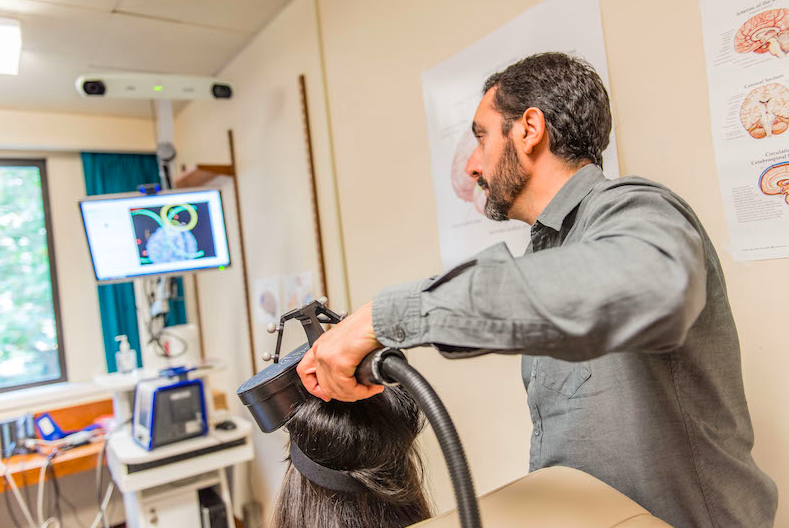 Clinical trials are underway by the Centre for Addiction and Mental Health (CAMH) in Canada for a new treatment option for major depressive disorder called Repetitive Transcranial Magnetic Stimulation (rTMS). The treatment is being hailed by rTMS researchers as transformative.
Clinical trials are underway by the Centre for Addiction and Mental Health (CAMH) in Canada for a new treatment option for major depressive disorder called Repetitive Transcranial Magnetic Stimulation (rTMS). The treatment is being hailed by rTMS researchers as transformative.
“As the mental health crisis in Canada is on the rise, there is a need for more options for treatment,” Olivia Larkin told us. Larkin is the Director of Social Impact for the Impakt Corporation. “rTMS can provide life saving treatment to those suffering from treatment-resistant depression.” (photo courtesy UBC Faculty of Medicine)
The Impakt Corporation just released a paper on rTMS funded by Hathaway Research International.
“We have just finished the first evidence-informed research paper to explore rTMS from the perspectives of patients, healthcare providers and policy makers, with the goal to increase awareness of this treatment and to move towards getting it covered publicly,” Larkin told us. “Not enough patients know about this treatment, and not enough health care providers know about its potential effects and recent advances.”
According to Statistics Canada, depression affects 5.4 per cent of people in Canada aged 15 and older. According to the National Institute of Mental Health, major depressive disorder or clinical depression affects 6.7 per cent of adults over the age of 18 in the United States.
rTMS works by changing brain circuits by stimulating nerve cells through short magnetic pulses to the brain. rTMS has been studied since the mid-80s for conditions such as Parkinson’s disease as well as depression and schizophrenia. Patients are awake during treatment which involves sitting in a chair while a doctor administers treatment that can range from five minutes to one hour.
According to a study published in the Lancet on rTMS, while antidepressants and therapy are the two main forms of treatment provided to people suffering from depression, studies have found that antidepressants only help 30 per cent of people and half of those people don’t benefit from therapy.
Dr. Fidel Vila-Rodriguez is heading up rTMS treatment in British Columbia.
“The scientific evidence regarding the efficacy of rTMS to treat depression is robust, and in the United States, this treatment is covered by the majority of insurance plans," Dr. Vila-Rodriguez told us. "Why don't Canadians have access to a treatment that works and is well tolerated? This is a question that needs to be addressed by provincial governments."
Authors of the paper gathered insight from doctors and patients about the treatment and found that the voice that was absent was the voice of the patient, and tried to bring that to light.
Larkin says they began working on the paper in the spring when a long-term friend of the Impakt Corporation who heads up Hathaway Research International came to them to talk about rTMS. He had recently seen first hand the transformative effects of this treatment and was shocked to find out how such a potentially effective treatment could be so unknown.
“Our goal when beginning this project was to understand the state of rTMS today in Canada, and find out the best way to make rTMS a more commonly accepted treatment option and work towards getting it publicly covered in all provinces,” Larkin told us. “We spoke with a number of doctors across the country who are in charge of the clinical trials of rTMS, as well as a couple patients. When we reviewed the existing available information and research on rTMS, we found that the voice that was absent was the voice of the patient. We decided a great way to achieve our goal from our standpoint was to bring out this perspective of the patient - to really tell the story of rTMS.”
rTMS researchers hope patients will consider it as a treatment option. They also want to ensure that health care practitioners are aware and have the most up to date information on rTMS so they can recommend it to their patients.
“We believe that if there is more of a demand to receive this treatment, it may put more pressure on the provincial governments to get it publicly covered,” Larkin told us. “Going forward, we would love to see more patients suffering from major depressive disorder and treatment resistant depression to consider rTMS as a viable and potentially lifesaving treatment.”
In addition to depression, CAMH is also currently conducting clinical trials of rTMS for obsessive- compulsive disorder, schizophrenia, autism spectrum disorder, post-traumatic stress disorder, eating disorders and smoking cessation.
Patricia Tomasi is a mom, maternal mental health advocate, journalist, and speaker. She writes regularly for the Huffington Post Canada, focusing primarily on maternal mental health after suffering from severe postpartum anxiety twice. You can find her Huffington Post biography here. Patricia is also a Patient Expert Advisor for the North American-based, Maternal Mental Health Research Collective and is the founder of the online peer support group - Facebook Postpartum Depression & Anxiety Support Group - with over 1500 members worldwide. Blog: www.patriciatomasiblog.wordpress.com
Email: tomasi.patricia@gmail.com